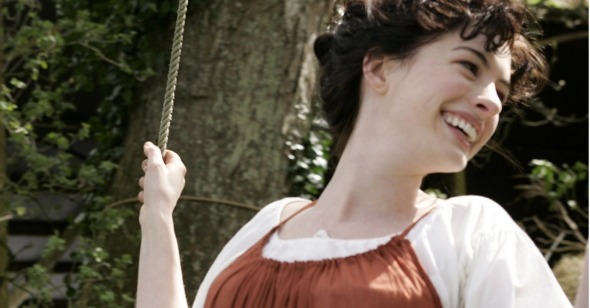Most Unbecoming
By Chris Wisniewski
Becoming Jane
Dir. Julian Jerold, U.K., Miramax
Towards the end of Becoming Jane, a new—and generally lousy—dramatization of the early life of novelist Jane Austen, a would-be suitor to the inimitable Ms. Austen utters the phrase, “It is a truth universally acknowledged...,” and the great opening line to Pride and Prejudice is born. It's no small concern that screenwriters Kevin Hood and Sarah Williams imagine their protagonist snatched one of her most famous lines from the lips of a man; indeed, Becoming Jane would have us believe that Austen, played here by the perennially boring Anne Hathaway, was nothing less, or more, than a watered-down variation on one of her own heroines, a woman who owed her inspiration as an artist to her doomed love affair with an Irish barrister (a suitably charismatic James McAvoy). This Shakespeare in Love style premise is tired enough on its own without the dubious implication of the romantic fantasies in which it trades. It's all right there in that execrable title: she was always a writer, but she needed to know the love of a man in order to...become Jane.
Inspired, more or less, by an actual episode from Austen's life, the film, directed by Julian Jerold (who made his feature film debut with the Chiwetel Ejiofor drag vehicle Kinky Boots), casts Austen as a precocious young woman of modest means. Pressured by her mother (Julie Walters) to make a good marriage, Jane refuses to settle for the awkward nephew of wealthy old Lady Gresham (Maggie Smith, bordering on self-parody in the stock Judi Dench role), holding out for that most elusive goal—a marriage built on love. Enter McAvoy's insolent and brash young Tom Lefroy. He yawns his way through a reading by Jane, and she responds first with a fit of self-loathing, then by lashing out at him with a little vitriol of her own. Their Elizabeth Bennett/Mr. Darcy style tête-á-tête goes on for about two scenes before they fall desperately in love, after which their dull affair plays itself out to its inevitable conclusion over the rest of the film's protracted two-hour runtime. “Your horizons must be...widened,” he tells her—though regrettably, nothing else gets widened in this chaste, charmless romance.
Becoming Jane isn't much interested in Austen as a writer, to the point that every time she writes or reads her work, Jarold cuts right over it or drowns her words in music. When the screenplay turns to sturdy Austen themes—the inevitable incompatibility between self-interest and affection, the hypocrisies that formed the basis of the bourgeois social fabric of the day—it does so with a leaden obviousness that's all text and no subtext, while the dialogue is uninspired to the point that Jane only manages to score one half-decent witticism (a quip about irony) in the whole film (though Hood and Williams are proud enough of that turn of phrase to have her repeat it later for good measure). Though it seems to be targeting the same audiences who have made art-house successes of previous Austen adaptations, this film lacks all of the qualities that distinguish Austen's novels as such great source material for the screen: it’s ironic that a film about the author responsible for arguably the most structurally perfect, delicately amusing novels ever written in the language, should be so lazily plotted and dramatically inert.
Compare this to Joe Wright's handsome, elegant Pride and Prejudice from 2005: both Jarold and Wright, following Austen's lead, are preoccupied with living space, environment, and milieu, but Wright is a real filmmaker—patient and astute, confident and controlled—and as a result his film feels vividly alive. Becoming Jane, on the other hand, is all surface and no insight, less a travesty than a middling effort that takes itself too seriously to be enjoyable as middlebrow trash. Why bother sitting through Becoming Jane when you could spend your time watching Wright's film or Ang Lee's exquisite Sense and Sensibility, or just picking up one of Austen's books instead? Its curious gender politics notwithstanding, Becoming Jane is mostly unobjectionable, but still, I can think of no compelling reason at all—not a single one—why this movie even exists in the first place.
